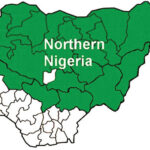Many of them have been compelled to flee their homes for fear of the unknown, while others are seeking alternative sources of livelihood.
It was learnt that as a result of the accumulation of floodwater, there was an outbreak of cholera in the affected areas. Twenty people reportedly died while 190 others were infected with the disease. Apart from the destruction of thousands of hectares of farmlands, the flood created streams in different locations within Gololo town, rendering the people helpless and confused.
- Arsenal sign Sada, 9-year-old football prodigy from Kaduna
- Police rescue pregnant woman, arrest abductors in Imo
The chairman of the Gololo Community Service, who doubles as the Sarkin Hausawan Gololo, Abba Alhaji Gololo, told Daily Trust that as a result of the flood, which has not receded at different locations, life has been extremely difficult for the people.
“Since the flood came upon Gololo, cholera has been ravaging the town. As I am talking to you, from the record in the Primary Health Care Centre, Gololo, a total of 190 people were infected, while 20 died.
“Right now, we have 10 patients on admission. We have reported the matter to the authorities because it has overwhelmed us. I am 50 years old, and since I was born, I have never seen a calamity like this at Gololo.
“For the past two weeks we have not witnessed rainfall, but the flood water has not receded,” he said.

“We are appealing to the state government and well-meaning people from the state and beyond to assist the people of Gololo with the construction of drainage to prevent future occurrence. There is a need to create a passage for rainwater. We also need relief materials, but let there be a permanent solution.
On the issue of relief materials or support from the government, Abba, said, “We have received some financial support from some people, especially the member representing us in the Bauchi State House of Assembly, a member of the House Representatives, the deputy governor of the state, chief of staff in the Government House. We used the money to save the community from total destruction. We used the money to buy food for youths who work in different locations. Every day, we give a N1,000 stipend to each person. The Community Service Committee has to borrow over N400,000, apart from the over N1million donations to support the exercise.”
A victim of the flood, Alhaji Abdulrashid Shattima Gololo, said the community spent five days battling the flood.
“We have never witnessed such flood in Gololo. When we noticed the movement of water from a long distance, we declared an emergency and summoned all the people of the town and began to dig a ditch to divert it. We assembled all the youth in the western part of the town and quickly sourced for hundreds of empty sacks and filled them with sand to block the entire town to save the lives of the people because the flood had already submerged the surrounding vicinity,” he said.
He, however, said that while the people were trying to create alternative waterways, the flood would flow into the community through other locations, a situation that led to the destruction of some houses.
“We mobilised hundreds of youths into the outskirts of the town, about six kilometres, to dig other waterways to divert the flood, especially from the northern part because the flow of water into the town continued to increase. And it was in the evening. We did not sleep throughout the night as we tried to control the water. Unfortunately, despite our efforts, a large volume of water submerged the town.
“Our crops have been destroyed and we have found ourselves in a difficult situation, especially as the rainy season has already reached three months and we don’t a river to enable us to engage in irrigation farming.
“When the incident happened, Governor Bala Mohammed sent his deputy, Senator Baba Tela, to visit the affected areas and pledge government’s intervention. A day after officials of the State Emergency Management Agency (SEMA) visited Gololo and carried out assessment of the damage, we felt the state government had responded to give us the hope that we would be assisted, but we are still waiting for the support of the government.
“Already, many people, especially the youth, have travelled out of Gololo to look for alternative sources of livelihood across cities within and outside the state because all their crops have been destroyed.
“We are calling on the Bauchi State Government to help the people of Gololo by constructing drainages and more culverts so as to avert future disaster,” Shettima said
Another victim of the flood, Alhaji Yakubu Gololo, also said, “Gololo town is not close to any major river, but the water came from a long distance without our knowledge. People of Gololo are not used to expecting such disaster; hence there was no alternative plan by farmers. We did not make any plan as we are used to rainy season farming. Usually, by the end of September, the season might end, so I am appealing to the state government to intervene and assist the victims.”
The village head of Gololo, who also lost three of his farms to the flood, Alhaji Abubakar Alkali Ahmed, said the disaster was a test from Allah to admonish the people on the virtues of patience and prayer.
“We have never seen a calamity like this. The worst part of it is that many people have lost their crops and they don’t have other means of livelihood because they are peasant farmers.
“Three of my farms were destroyed. I am still waiting for water to move away from the farm so that I may replant a variety of beans. Since I started farming 33 years ago, water has never destroyed my farm, but this season, flood has damaged all my crops, including millet, sorghum and sesame.
“We pray to God to touch the hearts of leaders at all levels to come to our aid. We have forwarded our requests to the authorities in both the state and federal government. They have sent the SEMA and the National Emergency Management Agency (NEMA) to visit Gololo and assess the level of destruction. But since they came and left, we have not heard anything from them. We are still appealing for government’s intervention,” Ahmed said.
When contacted over the reported cholera outbreak at Gololo, the executive chairman of the Bauchi State Primary Health Care Development Agency, Dr Rilwamu Mohammed, said they had since dispatched a rapid response team to the affected areas.

“We are aware of the cholera outbreak, but I cannot confirm the number of deaths at Gololo. Our team is working to tackle the spread of the disease in the area,” he said.
Daily Trust Saturday reports that the situation in Jama’are is more destructive because, apart from loss of lives and missing persons already recorded, over 50 communities lost their crops worth millions of naira.
It was learnt that 10 people lost their lives and three are still missing, while the flood submerged thousands of hectares of farmland. The situation compelled many of the affected farmers to flee their homes, especially those who received loans to buy agricultural inputs like improved seeds, fertiliser and equipment to expand their production.
Our correspondent who visited Jama’are observed that some of the victims of the flood resorted to fishing in their farms, which were submerged, while others engaged in fetching sand in the river to sell and feed their families. There were also reports that some of the victims developed mental disorders because of the magnitude of losses they suffered.
One of the victims and residents of Jama’are town, Musa Abdul, whose farm was turned to a stream at Anduwa village said, “Our family lost rice and maize worth over N50million in the flood disaster. Our dry season crops, especially rice, which has been cut for harvesting before evacuation, were washed away. Another large portion of the farm where the rice had matured for harvest has also been destroyed
“The worst part of the flood is how our farms were turned into streams. You can see for yourself how people troop to farm sites for fishing to feed their families. All efforts to drive out the water from the farm were not successful.

“We had over 200 young men who worked every day in our farms, but as a result of this disaster, majority of them have left for neighbouring Yobe and Jigawa states.”
Abdul further alleged that some of the affected farmers in Jama’are fled the town for fear that they may be forced to repay debts, saying that of them took loans to increase their rice production this farming season. He also confirmed that some of the affected victims developed a mental disorders.
“After seeing the level of destruction in his farm, one of my neighbours started talking abnormally and was rushed to a hospital. Another victim, out of shock from the disaster, could not sleep for over five days, and subsequently developed mental illness,” he added.
Abdul appealed to the federal and state governments to come to their aid because many of the affected farmers took loans under different cooperatives and sunk in their farms and they don’t have any means to repay back as a result of the flood disaster.
He said they used the money to buy improved seeds, fertiliser, modern machinery, including milling machines, to boost rice production. He added that they were in a dilemma as, according to him, up till now, nobody including government officials, has visited them in Jama’are to even commiserate with them, not to talk of assisting the victims.
Another victim of the flood in the Andiwa area of Jama’are Local Government Area, Bayero Isa, who lost his entire crops in three farms, said the situation compelled him to fish in his farms.
“Four weeks ago, I was planning to harvest a portion of the dry season rice in one of my farms. Also, in the biggest farm, the maize had already matured and I was hoping to harvest over 80 bags. For the rainy season rice, I also expected between 50 and 70 bags. But unfortunately, the flood has destroyed everything.
“My hope of boosting rice production has been dashed. The worst part of the calamity is the loans I got from a bank and individuals to increase production in order to have a bumper harvest this year.
“I rented another farm and bought enough improved seeds, fertiliser and pesticides, as well as paid for labour, but all my efforts are now in vain. The last farm is no longer in existence because the flood swallowed the entire area and moved all my crops into the river.
“I am 43 years old but I have never come across such unimaginable loss in my life. However, I have left everything to the Almighty Allah.
“I will not run away from home as some people did, but I have since removed the sim card from my phone because of many calls from traders who want their money.
“We are in dilemma. And nobody cares to come and condole us over the losses. You are the first person to come and commiserate with me. We hope the government would remember us,” Isa added.
Also, a 58-year-old resident of Gabirna village, Muhammed Inuwa, told Daily Trust Saturday that the flood did not only destroy their crops but had brought other calamities that would take the farmers backward. He said, “Apart from destroying crops, the flood also brought a lot of sand into our farms. It is so bad that after the season, many farmers would battle with the sand, especially in the dry season.
“We lost crops and many other investments in our farms. My fear is the long-term effects of the disaster. This is because many young men who ventured into rice production would end up in cities as commercial motorcycle (okada) riders, petty traders, as well as engage in menial jobs..
“We are appealing to the government at all levels to quickly intervene to save the situation by assisting the victims,” he said.
Findings by Daily Trust Saturday indicate that the flood destroyed thousands of large farmlands in over 50 communities in Jama’are, Katagum and Gamawa local government areas. The affected communities include Gwango, Gilari, Dogon Jaji, Abbari, Mayau, Ajingirai, Ganjuwa and Kusumo.
When contacted, the acting director of research and statistics of the SEMA, Adamu Nayola, said the agency had, two days before the flood, alerted the people, especially farmers on the riverside, to take precautionary measures. He added that the agency was working with the Department of Social Welfare in Jama’are Local Government on the way forward flood.
He added that the governor had set up a committee led by his deputy to examine the level of damage across the state and how best to support the victims.
Inaugurating the committee last month, Governor Mohammed said their terms of reference included inspecting all the areas affected by the flood to determine the extent of damage, with a view to assisting the victims. He also mandated the committee to seek the intervention of the federal government, as well as national, international and multilateral donor agencies, and suggest to the state government, measures to be adopted to avert future occurrence.

 Join Daily Trust WhatsApp Community For Quick Access To News and Happenings Around You.
Join Daily Trust WhatsApp Community For Quick Access To News and Happenings Around You.


